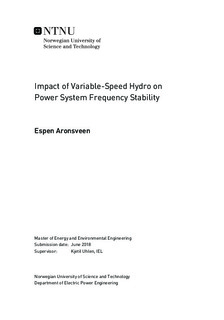Impact of Variable-Speed Hydro on Power System Frequency Stability
Master thesis
Date
2018Metadata
Show full item recordCollections
- Institutt for elkraftteknikk [2503]
Abstract
In this thesis the impacts of variable-speed hydro on the system frequency is studied, by developing a simplified power system model in Simulink based on the swing equation and DC power flow. The model is verified against a higher-order AC model in a test network, before optimal control of the variable-speed plant is investigated. The control variable for the variable-speed plant is the frequency deviation from the nominal frequency, meaning a large drop in frequency leads to a large contribution during the fault. Only the size of the fault was found to be of importance to the variable-speed plant's contribution to frequency containment, not the location. The location of the variable-speed plant itself did not have significant impacts on the results either, only the share of variable-speed capacity. The improved ability to contain the frequency nadir was relatively much larger with small shares introduced. The improvement had a decreasing trend with greater shares of variable-speed capacity in the system. Variable-speed hydro technology shows great promise in the field of primary frequency control, and could play an important role in securing the frequency stability in the future power system.
